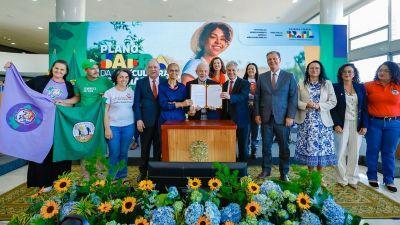
Brazil Launches Programme to Reduce Pesticide Use
Brazil, the world’s largest producer of coffee and soybeans, has taken a significant step towards promoting healthier and more sustainable food production among its farmers. Brazilian President Lula da Silva has signed a decree establishing the National Programme for the Reduction of Pesticides (Pronara), aimed at gradually reducing pesticide use across the country’s agricultural sector.
The launch of Pronara is a major milestone in Brazil’s efforts to reduce its environmental footprint and ensure a safer food supply for its citizens. The programme is designed to provide farmers with alternative practices and technologies that minimize the use of pesticides, while maintaining or increasing crop yields.
Pronara is a comprehensive initiative that involves the government, farmers, and other stakeholders in the agricultural sector. The programme will focus on promoting integrated pest management (IPM) practices, which combine physical, cultural, biological, and chemical controls to manage pests. This approach is more effective and environmentally friendly than relying solely on chemical pesticides.
The programme will also provide training and technical assistance to farmers, as well as financial incentives to encourage them to adopt IPM practices. This will help farmers to reduce their dependence on pesticides and improve the overall sustainability of their farming operations.
The launch of Pronara is a significant development in Brazil’s agricultural sector, which has been facing growing pressure to reduce its environmental impact. The country’s farmers are among the largest users of pesticides in the world, and the widespread use of these chemicals has raised concerns about their impact on human health and the environment.
Pesticides have been linked to a range of health problems, including cancer, neurological damage, and reproductive issues. They have also been shown to contaminate soil, water, and air, and can harm beneficial insects and other non-target organisms.
The environmental impact of pesticides is just as concerning. They can contaminate soil and water, and can contribute to the decline of beneficial insects and other species. Pesticides have also been linked to the decline of pollinators, such as bees and butterflies, which are essential for food production.
By reducing pesticide use, Brazil can help to protect the health of its citizens and the environment. The country can also benefit from the economic advantages of sustainable agriculture, including lower production costs and improved market access.
The launch of Pronara is a significant step towards achieving these goals. The programme is designed to be flexible and adaptable, and will be implemented in collaboration with farmers, agricultural associations, and other stakeholders.
The programme will also provide opportunities for innovation and entrepreneurship in the agricultural sector. By promoting the development of new technologies and practices, Pronara can help to create new business opportunities and stimulate economic growth.
The launch of Pronara is a major achievement for Brazil’s agricultural sector, and is likely to have a significant impact on the country’s food production and environmental sustainability. The programme is a testament to the country’s commitment to sustainable agriculture and its determination to reduce its environmental footprint.
As the programme is rolled out across the country, it is likely to face challenges and obstacles. However, with the support of farmers, agricultural associations, and other stakeholders, Pronara has the potential to make a significant difference in Brazil’s agricultural sector.
Source: https://agritimes.co.in/global/brazil-launches-pronara-to-cut-pesticides



